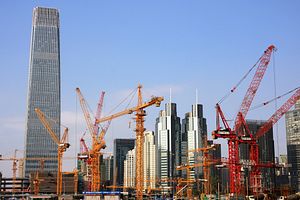China has announced that it will focus on supply-side reform in 2016, improving factors of production such as labor and equipment and enhancing efficiency in production. These announcements emerged from the Central Economic Work Conference, a closed meeting attended by senior party officials led by President Xi Jinping. China is also continuing to work toward some degree of capital account and exchange rate liberalization.
In order to carry out supply side reform, China will reduce industrial overcapacity, cut the inventory of unsold homes, lower costs for firms, and guard against financial risks, including local government debt risks. Inefficient or outdated firms will undergo bankruptcy or be merged. At the same time, new and efficient industries are to be encouraged. Foreign investment should be better utilized. Urbanization and ecological protection are to be promoted. All of this should occur, according to a summary of the meeting laid out by state news agency Xinhua, under macroeconomic stability and expanding consumer demand.
China is moving away from a manufacturing-based economy to a service-based economy, and has ended a period of intensive fixed asset investment. Overcapacity within the steel industry, for example, has resulted in zero profitability of steel companies and insufficient demand, not to mention supply gluts in the global market. Firms that are inefficient are to enter bankruptcy or be merged with other firms. Excess investment in the real estate sector has also led to an oversupply of houses, which has led to falling home prices, especially outside of the larger cities. Promotion of urbanization policies may help to shore up the demand for real estate.
Much of the oversupply in manufacturing and real estate occurred as a result of or in tandem with overlending to local governments, which accumulated massive amounts of debt building up infrastructure in recent years. The risks of local government debt default are to be controlled in this coming year in order to maintain financial stability. The issuance of local government bonds has allowed local governments to stay afloat despite holding high levels of debt. Certainly, improving the real estate outlook will help local governments to improve the prospect of further land development and land sales for generating revenue.
Costs for firms are to be cut by reducing taxes and fees, improving administrative procedures, and reducing social security contributions. These steps will encourage growth of domestic firms. New industries will continue to be promoted; the high-tech industry is growing rapidly, and foreign investment in this industry is expanding along with it. Telecommunications, e-commerce, and new energy sectors are growing as well.
Goals to maintain macroeconomic stability have been a cornerstone of Chinese economic policy since reform and opening up, in an effort to maintain growth and keep inflation under control. Boosting consumer demand is a somewhat newer task, and with consumer demand rising slowly, it may take some time for demand to make up for other types of spending. However, China’s upper middle class is growing, set to almost double as a percentage of urban households by 2020, which will ensure ongoing expansion of consumer spending.
China’s leadership has stated that its capital account will be liberalized by 2020, and that its exchange rate will continue to reflect market forces. This process will be aided by the RMB’s recent inclusion into the IMF’s basket of reserve currencies, on the condition that further exchange rate liberalization will take place. The move also increases the attractiveness of holding RMB-denominated assets and will help to push forward opening of the capital account.

































